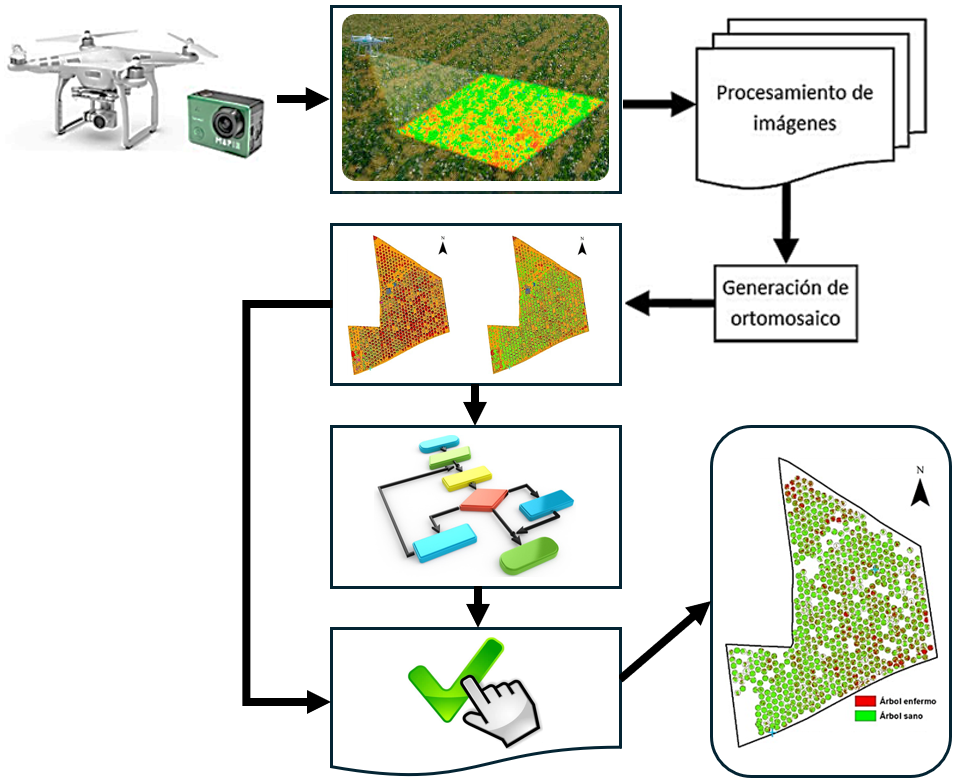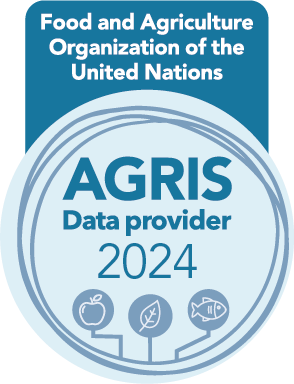Identification of the phytosanitary status of trees using machine learning and very high spatial resolution images
DOI:
https://doi.org/10.17268/sci.agropecu.2024.013Keywords:
precision agriculture, sick trees, citrus, Orange, Mexico, Unmanned aerial vehicleAbstract
Tree diseases contribute to significant economic and food losses in the agricultural sector. Early detection of phytosanitary problems in trees with non-destructive methods is essential to guarantee sustainable orange production. This study presents the findings of a designed methodology conducted to identify diseased orange trees in an orchard situated in the citrus belt of Mexico, specifically in the Rioverde region of San Luis Potosi. To accomplish this, we captured images using a multispectral camera with very high spatial resolution, which was mounted on an unmanned aerial vehicle. These images were used to construct a georeferenced orthomosaic of the orchard. Six thematic classes were established to distinguish various health levels among the trees. We employed several supervised classification algorithms at the pixel level, including Random Forest (RF), K-Nearest Neighbor (KNN), Spectral Angle Mapper (SAM), Support Vector Machine (SVM), and Maximum Likelihood (ML). Considering the classification accuracy achieved by each algorithm, they can be ranked as follows: Maximum Likelihood (ML) with 88.10%, Support Vector Machine (SVM) with 77.38%, Spectral Angle Mapper (SAM) with 76.19%, K-Nearest Neighbor (KNN) with 64.68%, and Random Forest (RF) with 61.90%. These results successfully identified the phytosanitary status of all the trees in the orchard with an acceptable level of accuracy, providing valuable management information for the grower.
References
Abdulridha, J., Batuman, O., & Ampatzidis, Y. (2019). UAV-Based Remote Sensing Technique to Detect Citrus Canker Disease Utilizing Hyperspectral Imaging and Machine Learning. Remote Sensing, 11(11), 1373. https://doi.org/10.3390/rs11111373
Ali, H., Lali, M. I., Nawaz, M. Z., Sharif, M., & Saleem, B. A. (2017). Symptom based automated detection of citrus diseases using color histogram and textural descriptors. Computers and Electronics in Agriculture, 138, 92-104. https://doi.org/10.1016/j.compag.2017.04.008
Alzubi, E., Shbikat, N., & Noche, B. (2023). A system dynamics model to improving sustainable performance of the citrus farmers in Jordan Valley. Cleaner Production Letters, 4, 100034. https://doi.org/10.1016/j.clpl.2023.100034
Ampatzidis, Y., Partel, V., & Costa, L. (2020). Agroview: Cloud-based application to process, analyze and visualize UAV-collected data for precision agriculture applications utilizing artificial intelligence. Computers and Electronics in Agriculture, 174, 105457. https://doi.org/10.1016/j.compag.2020.105457
Antolínez, C.A., Olarte-Castillo, X.A., Martini, X., & Rivera, M.J. (2022). Influence of daily temperature maximums on the development and short-distance movement of the Asian citrus psyllid. Journal of Thermal Biology, 110, 103354. https://doi.org/10.1016/j.jtherbio.2022.103354
Atta, S., Zhou, C., Zhou, Y., Cao, M., & Wang, X. (2012). Distribution and Research Advances of Citrus tristeza virus. Journal of Integrative Agriculture, 11(3), 346-358. https://doi.org/10.1016/S2095-3119(12)60019-7
Balfagón, D., Arbona, V., & Gómez-Cadenas, A. (2021). El futuro de los cítricos: Impacto del cambio climático en la citricultura. Metode Science Studies Journal, 110, 61-67. https://doi.org/10.7203/metode.12.20319
Barman, U., & Choudhury, R. D. (2022). Smartphone assist deep neural network to detect the citrus diseases in Agri-informatics. Global Transitions Proceedings, 3(2), 392-398. https://doi.org/10.1016/j.gltp.2021.10.004
Bassanezi, R. B., Primiano, I. V., & Vescove, H. V. (2021). Effect of enhanced nutritional programs and exogenous auxin spraying on huanglongbing severity, fruit drop, yield and economic profitability of orange orchards. Crop Protection, 145, 105609. https://doi.org/10.1016/j.cropro.2021.105609
Berk, Z. (2016). Chapter 5 - Diseases and pests. Citrus Fruit Processing. 83-93. https://doi.org/10.1016/B978-0-12-803133-9.00005-9
Braham, M., Boulahia-Kheder, S., Kahia, M., & Nouira, S. (2023). Aphids and citrus responses to nitrogen fertilization. Journal of the Saudi Society of Agricultural Sciences, S1658077X23000322. https://doi.org/10.1016/j.jssas.2023.03.003
Calou, V. B. C., Teixeira, A. D. S., Moreira, L. C. J., Lima, C. S., De Oliveira, J. B., & De Oliveira, M. R. R. (2020). The use of UAVs in monitoring yellow sigatoka in banana. Biosystems Engineering, 193, 115-125. https://doi.org/10.1016/j.biosystemseng.2020.02.016
Chang, A., Yeom, J., Jung, J., & Landivar, J. (2020). Comparison of Canopy Shape and Vegetation Indices of Citrus Trees Derived from UAV Multispectral Images for Characterization of Citrus Greening Disease. Remote Sensing, 12(24), 4122. https://doi.org/10.3390/rs12244122
Deng, X., Huang, Z., Zheng, Z., Lan, Y., & Dai, F. (2019). Field detection and classification of citrus Huanglongbing based on hyperspectral reflectance. Computers and Electronics in Agriculture, 167, 105006. https://doi.org/10.1016/j.compag.2019.105006
El Imanni, H. S., El Harti, A., El Mostafa, B., Mouncif, H., Eddassouqui, F., Achraf Hasnai, M., & Ismail Zinelabidine, M. (2023). Multispectral UAV data for detection of weeds in a citrus farm using machine learning and Google Earth Engine: Case study of Morocco. Remote Sensing Applications: Society and Environment, 30, 100941. https://doi.org/10.1016/j.rsase.2023.100941
Estrada-Zúñiga, A. C., Cárdenas, J., Víctor Bejar, J., & Ñaupari, J. (2022). Biomass estimation of a high Andean plant community with multispectral images acquired using UAV remote sensing and Multiple Linear Regression, Support Vector Machine and Random Forests models. Scientia Agropecuaria, 13(3), 301-310. https://doi.org/10.17268/sci.agropecu.2022.027
Ezrari, S., Radouane, N., Thiri, A., El Housni, Z., Mokrini, F., et al. (2022). Dry root rot disease, an emerging threat to citrus industry worldwide under climate change: A review. Physiological and Molecular Plant Pathology. 117, 101753. https://doi.org/10.1016/j.pmpp.2021.101753
Freitas, T. A., Proença, C. A., Baldo, T. A., Materón, E. M., Wong, A., Magnani, R. F., & Faria, C. F. (2019). Ultrasensitive immunoassay for detection of Citrus tristeza virus in citrus sample using disposable microfluidic electrochemical device. Talanta, 205, 120110. https://doi.org/10.1016/j.talanta.2019.07.005
Garcia-Ruiz, F., Sankaran, S., Maja, J. M., Lee, W. S., Rasmussen, J., & Ehsani, R. (2013). Comparison of two aerial imaging platforms for identification of Huanglongbing-infected citrus trees. Computers and Electronics in Agriculture, 91, 106-115. https://doi.org/10.1016/j.compag.2012.12.002
Godefroid, M., (2023). Species distribution models predicting climate suitability for the psyllid Trioza erytreae, vector of citrus greening disease. Crop Protection. 168: 106228. https://doi.org/10.1016/j.cropro.2023.106228
Hajeri, S., & Yokomi, R. (2023). Chapter 6 - Citrus tristeza virus. Plant RNA viruses. 117-133. https://doi.org/10.1016/B978-0-323-95339-9.00009-0
Huang, C., Davis, L. S., & Townshend, J. R. G. (2002). An assessment of support vector machines for land cover classification. International Journal of Remote Sensing, 23(4), 725-749. https://doi:10.1080/01431160110040323
Kruse, F. A., Heidebrecht, K. B., Shapiro, A. T., Barloon, P. J., & Goetz, A. F. H. (1993). The Spectral Image Processing System (SIPS) Interactive Visualization and Analysis of Imaging Spectrometer Data. Remote Sensing of Environment, 44, 145-163. https://doi.org/10.1016/0034-4257(93)90013-N
Kumar, A., Lee, W. S., Ehsani, R. J., Albrigo, L. G., Yang, C., & Mangan, R. L. (2012). Citrus greening disease detection using aerial hyperspectral and multispectral imaging techniques. Journal of Applied Remote Sensing, 6, 063542. https://doi:10.1117/1.JRS.6.063542
Lan, Y., Huang, Z., Deng, X., Zhu, Z., Huang, H., et al. (2020). Comparison of machine learning methods for citrus greening detection on UAV multispectral images. Computers and Electronics in Agriculture, 171, 105234. https://doi.org/10.1016/j.compag.2020.105234
Li, H., Lee, W. S., Wang, K., Ehsani, R., & Yang, C. (2013). Extended spectral angle mapping (ESAM) for citrus greening disease detection using airborne hyperspectral imaging. Precision Agriculture, 15(2). https://doi:10.1007/s11119-013-9325-6
Milind, L. (2023). Chapter 23 - World fresh citrus trade and quarantine issues. Citrus Fruit (second Edition). Biology, Technology and Evaluation. 737-761. https://doi.org/10.1016/B978-0-323-99306-7.00017-7
Moriya, É. A. S., Imai, N. N., Tommaselli, A. M. G., Berveglieri, A., Santos, G. H., Soares, M. A., Marino, M., & Reis, T. T. (2021). Detection and mapping of trees infected with citrus gummosis using UAV hyperspectral data. Computers and Electronics in Agriculture, 188, 106298. https://doi.org/10.1016/j.compag.2021.106298
Moussaid, A., El Fkihi, S., & Zennayi, Y. (2020). Citrus orchards monitoring based on remote sensing and artificial intelligence techniques: A review of the literature. Science and In Proceedings of the 2nd International Conference on Advanced Technologies for Humanity - ICATH, 1, 172-178. https://doi.org/10.5220/0010432001720178
Pal, M. (2005). Random forest classifier for remote sensing classification. International Journal of Remote Sensing, 26(1), 217-222. https://doi.org/10.1080/01431160412331269698
Pino-Vargas, E. M., & Huayna, G. (2022). Spatial and temporal evolution of olive cultivation due to pest attack, using remote sensing and satellite image processing. Scientia Agropecuaria, 13(2), 149-157. https://doi.org/10.17268/sci.agropecu.2022.013
Rozenberg, G., Kent, R., & Blank, L. (2021). Consumer‑grade UAV utilized for detecting and analyzing late‑season weed spatial distribution patterns in commercial onion felds. Precision Agriculture, 22, 1317-1332. https://doi.org/10.1007/s11119-021-09786-y
Scheeres, J., De Jong, J., Brede, B., Brancalion, P. H. S., Broadbent, E. N., et al. (2023). Distinguishing forest types in restored tropical landscapes with UAV-borne LIDAR. Remote Sensing of Environment, 290, 113533. https://doi.org/10.1016/j.rse.2023.113533
Shao, G., Han, W., Zhang, H., Liu, S., Wang, Y., Zhang, L., & Cui, X. (2021). Mapping maize crop coefficient Kc using random forest algorithm based on leaf area index and UAV-based multispectral vegetation indices. Agricultural Water Management, 252, 106906. https://doi.org/10.1016/j.agwat.2021.106906
SAGARPA (2021). Sistema de Información Agroalimentaria de Consulta (SIACON). Servicio de Información Agroalimentaria y Pesquera (SIAP). https://www.gob.mx/siap/documentos/siacon-ng-161430. Consulta 3 de abril de 2023
Spreen, T. H., Gao, Z., Fernandes, W., & Zansler, M. L. (2020). Global economics and marketing of citrus products. The Genus Citrus, 471-493. https://doi:10.1016/b978-0-12-812163-4.00023-1
Sun, J., Yang, J., Zhang, C., Yun, W., & Qu, J. (2013). Automatic remotely sensed image classification in a grid environment based on the maximum likelihood method. Mathematical and Computer Modelling, 58(3-4), 573-581. https://doi.org/10.1016/j.mcm.2011.10.063
Tuwo, M., Kuswinanti, T., Nasruddin, A. & Tambaru, E. 2024. Uncovering the presence of CVPD disease in citrus varieties of South Sulawesi, Indonesia: A molecular approach. Journal of Genetic Engineering and Biotechnology, 22, 100332. https://doi.org/10.1016/j.jgeb.2023.100332
Xie, C., & Lee, W. S. (2021). Detection of citrus black spot symptoms using spectral reflectance. Postharvest Biology and Technology, 180, 111627. https://doi.org/10.1016/j.postharvbio.2021.111627
Xu, C., Alhejaili, W., Saifullah, S., Khan, A., Khan, J., & El-Shorbagy, M.A. (2022). Analysis of Huanglongbing disease model with a novel fractional piecewise approach. Chaos, Solitons & Fractals. 161: 112316. https://doi.org/10.1016/j.chaos.2022.112316
Yagoub, H., Belbachir, A. H., & Benabadji, N. (2014). Detection and mapping vegetation cover based on the Spectral Angle Mapper algorithm using NOAA AVHRR data. Advances in Space Research, 53(12), 1686-1693. https://doi.org/10.1016/j.asr.2014.03.020
Zabihi, H., Vogeler, I., Amin, Z. M., & Gourabi, B. R. (2016). Mapping the sensitivity of citrus crops to freeze stress using a geographical information system in Ramsar, Iran. Weather and Climate Extremes, 14, 17-23. https://doi.org/10.1016/j.wace.2016.10.002

Published
How to Cite
Issue
Section
License
Copyright (c) 2024 Scientia Agropecuaria

This work is licensed under a Creative Commons Attribution-NonCommercial 4.0 International License.
The authors who publish in this journal accept the following conditions:
a. The authors retain the copyright and assign to the magazine the right of the first publication, with the work registered with the Creative Commons attribution license, which allows third parties to use the published information whenever they mention the authorship of the work and the First publication in this journal.
b. Authors may make other independent and additional contractual arrangements for non-exclusive distribution of the version of the article published in this journal (eg, include it in an institutional repository or publish it in a book) as long as it clearly indicates that the work Was first published in this journal.
c. Authors are encouraged to publish their work on the Internet (for example, on institutional or personal pages) before and during the review and publication process, as it can lead to productive exchanges and a greater and faster dissemination of work Published (see The Effect of Open Access).




